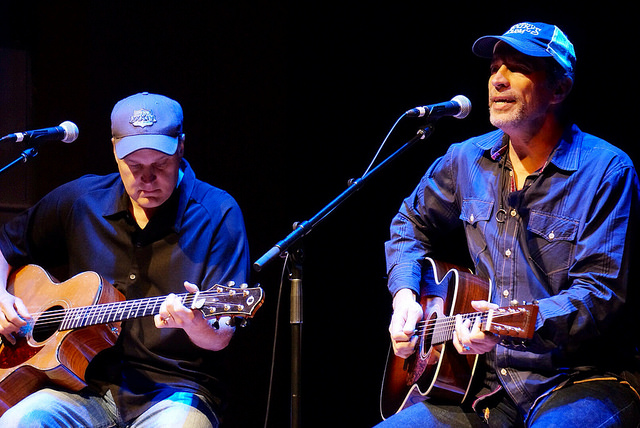We attend conferences so we can deepen our knowledge and relationships. Hopefully we’ll also get recharged and inspired too but that doesn’t always happen. I was fortunate enough to come away from the 2014 digitalNow conference in Nashville both recharged and inspired thanks to being surrounded by smart people, good friends, savvy conference organizers and the very cool city of Nashville.
After a bountiful breakfast from the talented kitchen at the Omni Nashville, digitalNow attendees entered the theater at the adjoining Country Music Hall of Fame and Museum to await the conference welcome. I was expecting to see Hugh Lee and Don Dea of Fusion Productions, the brains behind digitalNow, walk on stage but instead the theater lights dimmed and I heard the opening chords of a familiar song. A spotlight shone on Nashville residents Gordon Kennedy and Wayne Kirkpatrick playing a little something they wrote for Eric Clapton, Change the World.

(photo by Bill Sheridan)
…if I could change the world…
digitalNow’s opening keynote speaker, Adam Braun, founder of Pencils of Promise, is changing the world, one pencil, one school and one child at a time. By the time Adam turned 25, he had already been a Wall Street child prodigy, Brown University graduate, shipwreck survivor and world traveler.
During his travels, he asked a child who was begging in the streets of India, “If you could have anything in the world, what would it be?” The little boy answered, “A pencil.”
The average pencil holds 45,000 words, Adam said. It provides access to self-education and unlocks a child’s curiosity and imagination. Adam started handing out thousands of pencils in his backpacking trips across six continents. Now, his organization, Pencils of Promise, builds schools (200 so far!), trains teachers and provides scholarships to students.
Adam shared several lessons he learned along the way – lessons that apply to both people and organizations.
We are not in the non-profit business. We’re in the for-purpose business. Adam hates the term “non-profit.” He believes “non-profit” is a negative term that doesn’t define our work and strips our organizations of their value. Pencils of Promise is “100% for purpose.” We all know that “non-profit” is merely a tax status, but I wonder how many organizations excite their community with their purpose.
When your members think about your association, do they only think about the products and services you offer, or do they think about being a part of a movement that is changing the world?
Nothing is more powerful than discovering purpose. Adam shared the journey that led him to discovering his purpose. Purpose, not possessions, gives life meaning. However, many of us are so busy living our ordinary lives that we don’t think about purpose. How can associations help members find and live lives of purpose?
True self-discovery is on the edge of your comfort zone. If your dreams do not scare you, then they’re not big enough. When you have big goals and do scary things, you end up becoming a much more grounded and happy person.
I can vouch for that even though I figured it out much later in life than Adam. Although I have very risk-averse genes, I moved across country twice, started my own business, climbed Angel’s Landing in Zion National Park and, most recently, climbed over exposed slickrock domes, chimneyed in a slot canyon and rappelled down cliffs in Capitol Reef National Park.
I don’t list these experiences to brag. That’s not my motivation — although I do admit to still bragging about Angel’s Landing since I gave myself a 30% chance of doing it. I want to encourage you to go for the gusto. Prepare yourself and do it, whatever “it” is. Even if it makes you very uneasy. You’ll be a changed person once you stretch your comfort zone and overcome your fear.
Associations are on the edge of their comfort zone right now dealing with new ways of associating, learning and communicating, new technology, new competition, and new expectations. This is also a time of new opportunity. Associations who push through their fear will become stronger and better positioned to be agents of transformation for their members.

(photo by Dale Beckett/Flickr CC license)
The quality, not quantity, of an engaged and loyal following is key. It’s not about converting the masses; it’s about finding the one person in the room whose eyes light up. Adam told the story of one of their “torchbearers,” Chelsea, the only person who showed up at one of their meetings. She became a huge supporter and organizer. Are you paying attention to the people in your community whose eyes light up when talking about your mission? Not just the usual suspects but those on the periphery?
Take advantage of the belief people have that they can change the world. I wonder, do GenX and Boomers still believe they can change the world? I know some of us do. The members on your board better believe it too.
Thankfully, Millennials believe they can change the world. And Adam calls the generation after the Millennials, “Generation Why Not.” If younger people don’t see your association as a community where they can make contributions and create change, they’ll find another where they can.
Build a movement and mobilize people by making them the heroes of the journey. Stop talking about the association and start talking about the work your members and volunteers do – how they are creating (or can create) something bigger than themselves.
Find ways to make people feel like important members of a purposeful community. Adam gave business cards to early supporters of Pencils of Purpose. They built a digital platform where torchbearers can tell their own stories. They tag contributors’ name on social media platforms to show them (and their friends) what they’re creating.
Speak the language of the person you want to become — your future aspirational self. Use the language of self-realization, for example, instead of saying, “We’re hoping to build a school,” say, “We’re building a school.” Guess what happens? People will think of you in those aspirational terms and connect you with those who can help you do it. Say it and make it so.
Do you want to help change the world? Together, we are building a classroom for kids who never imagined they would sit in one. We’ll give little girls and boys the chance to unleash their minds and escape the worst kind of poverty. Visit http://www.thedigitalnowpromise.com and contribute what you can to digitalNow’s team fundraising page for Pencils for Promise.


Great recap, Deirdre! DigitalNow is my favorite conference, and this year’s show didn’t disappoint. I loved Adam’s notion of “speaking the language of the person you want to become,” and his claim that we are here to serve, not to be served. Powerful and inspiring!
LikeLike
Thanks, Bill, and thanks for the photo. digitalNow is my favorite conference too and Adam’s keynote was an inspiring way to kick it off.
LikeLike
Deidre,
Well done! I will be passing this along to all of our staff. In our one session we found that 10 out of 10 associations were experiencing severe to moderate disruption in their business models. Your point, “Associations are on the edge of their comfort zone right now dealing with new ways of associating, learning and communicating, new technology, new competition, and new expectations. This is also a time of new opportunity. Associations who push through their fear will become stronger and better positioned to be agents of transformation for their members.” says it well.
Thanks for the recap and inspiration!
Tom
LikeLike
Let’s see if we can keep the #diginow inspiration going for a while!
LikeLike
Oops I know better – Deirdre not Deidre – my apologies…
LikeLike
Spelling errors made at 5:47 a.m. are excused — thanks for coming back to correct it!
LikeLike